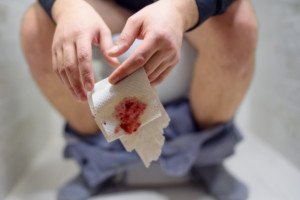
It’s one frightening experience: You wipe yourself after pooping, glance at the toilet paper and see red or pink smeared in with the poop stain.
Your heart races; your breathing stops; your eyes don’t blink as your mouth hangs open. You wonder if it’s colon cancer.
“As a gastroenterologist, I take all rectal bleeding seriously, but there are some elements in the patient’s history that point more in the direction of a hemorrhoid bleeding as opposed to a lesion in the colon,” says Dr. Caterina Oneto, MD, a gastroenterologist and internal medicine specialist with NYU Langone Health.
Dr. Oneto continues, “Blood ‘just on the toilet paper’ is one of them. Still, always see your doctor when you experience any form of rectal bleeding.”
A lesion in the large colon that can cause blood to come out with stools (and make its way to the tissue paper) may be an ulcer, a polyp or a malignant tumor.
A pinkish or reddish smear on the toilet paper may also be from an irritated (and bleeding) skin tag at the anal opening.
Such a skin tag is typically soft, fleshy and can vary in size.
While they’re usually harmless, they can sometimes cause discomfort, especially if they become irritated or if there is friction from clothing — which can cause a little bleeding.
Other Causes of Blood on the Toilet Paper but No Sign of It in Your Poops
When you wipe, the tissue paper not only makes contact with the anal opening, but also with the urethral and (for women, of course) vaginal opening – assuming that you wipe thoroughly: from back to front.
A problem (not necessarily malignant) with the urethra, vagina, cervix or uterus can cause blood to appear on the tissue paper but not in the stools you see in the toilet bowl.
If a colonoscopy has ruled out a lesion in the colon, you are still not in the clear.
You need to get your urethra examined, and if you’re a woman, you need an internal pelvic exam as a start.
It could just be a coincidence that the first time you saw blood on the toilet paper was when you had a bowel movement.
This doesn’t mean the blood is directly connected to having a bowel movement (e.g., irritation of a hemorrhoid), but more so because your wiping made contact with blood that was near the urethral or vaginal entrance.
 Dr. Oneto’s expertise includes colonoscopy, endoscopy and liver and pancreatic disease, and her special interests include colon cancer screening and prevention, and management of GERD, IBS and obesity.
Dr. Oneto’s expertise includes colonoscopy, endoscopy and liver and pancreatic disease, and her special interests include colon cancer screening and prevention, and management of GERD, IBS and obesity.
 Lorra Garrick has been covering medical, fitness and cybersecurity topics for many years, having written thousands of articles for print magazines and websites, including as a ghostwriter. She’s also a former ACE-certified personal trainer.
Lorra Garrick has been covering medical, fitness and cybersecurity topics for many years, having written thousands of articles for print magazines and websites, including as a ghostwriter. She’s also a former ACE-certified personal trainer.
.









































